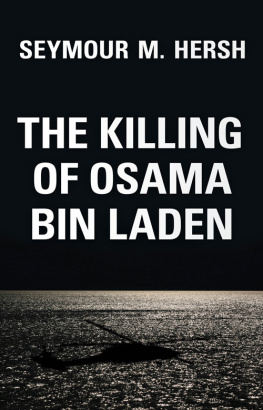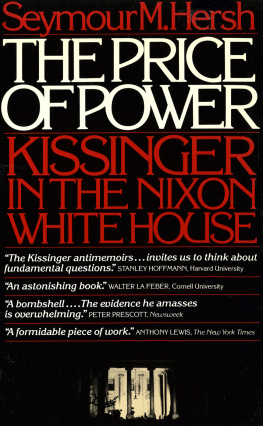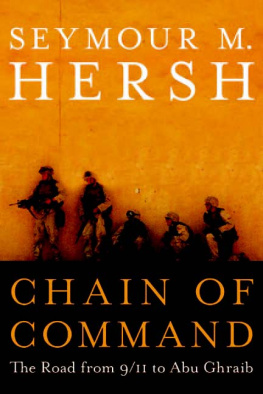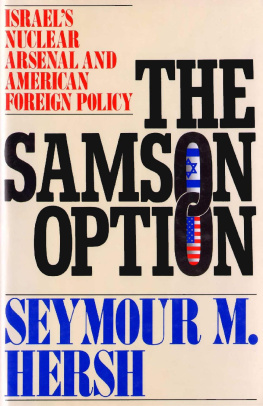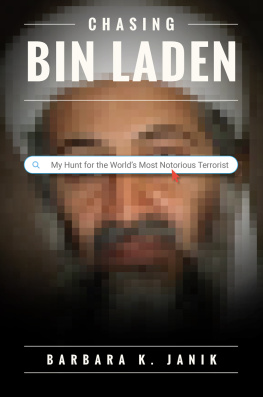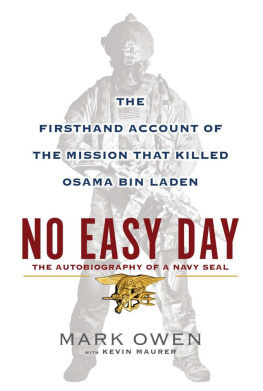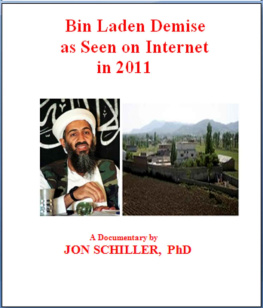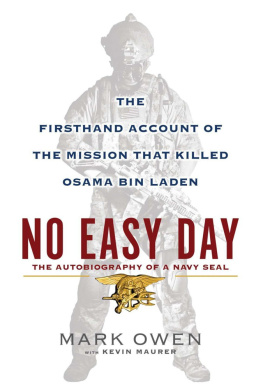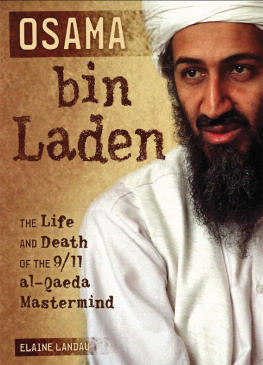The Killing of Osama bin Laden
Seymour M. Hersh

First published by Verso 2016
Seymour M. Hersh 2016
The publisher would like to thank the London Review of Books, where the
four chapters of this book were first published: , Vol. 37, No. 10,
May 21, 2015; , Vol. 35,
No. 24, December 19, 2013; , Vol. 38, No. 1, January 7, 2016
All rights reserved
The moral rights of the author have been asserted
1 3 5 7 9 10 8 6 4 2
Verso
UK: 6 Meard Street, London W1F 0EG
US: 20 Jay Street, Suite 1010, Brooklyn, NY 11201
versobooks.com
Verso is the imprint of New Left Books
ISBN-13: 978-1-78478-436-2
ISBN-13: 978-1-78478-437-9 (US EBK)
ISBN-13: 978-1-78478-438-6 (UK EBK)
British Library Cataloguing in Publication Data
A catalogue record for this book is available from the British Library
Library of Congress Cataloging-in-Publication Data
Names: Hersh, Seymour M., author.
Title: The killing of Osama Bin Laden / Seymour M. Hersh.
Description: Brooklyn, NY : Verso Books, 2016. | Includes index.
Identifiers: LCCN 2016002833 | ISBN 9781784784362 (hardback : alk. paper) | ISBN 9781784784379 (US ebook) | ISBN 9781784784386 (UK ebook)
Subjects: LCSH: United StatesForeign relations2009- | United StatesMilitary policy. | Obama, BarackInfluence. | Bin Laden, Osama, 19572011Assassination.
Classification: LCC E907 .H48 2016 | DDC 327.73009/05dc23
LC record available at http://lccn.loc.gov/2016002833
Typeset in Sabon by MJ & N Gavan, Truro, Cornwall, UK
Printed in the US by Maple Press
For Christian and the rest of the gang at the LRB,
who know what they are doing
Contents
The reportage in this collection has a common themefalse steps by an American president who came to office in 2009 after a brilliant campaign in which he spoke of hope and change we can believe in. Political words are just words, as people everywhere in the world have come to understand, but Barack Obamas rhetoricthe first African-American president of the United Statesseemed to strike a chord after eight years of George Bush and Dick Cheney. In his first inaugural address, Obama emphasized the rule of law and the rights of man, declaring, Those ideals still light the word, and we will not give them up for expediences sake.
Yet he is a president who told the world a series of lies about the killing of Osama bin Laden in May 2011, some of which recklessly put an ally at risk; who in August 2013, sought congressional approval to bomb Syria, while concealing the fact he had been put on notice that the nerve agent allegedly used by Assad didnt match any of those known to be in Syrias arsenal; who secretly authorized the Central Intelligence Agency to set up a backchannel flow of arms and ammunition, including anti-aircraft missiles, from chaotic post-Qaddafi Libya via Turkey to Syrian rebels, many of them fanatic Islamists; who ignored repeated US and allied intelligence reports throughout early 2013 depicting the Turkish government, led by President Recep Tayyip Erdoan, as a vital, and hidden, supporter of al-Nusra and ISIS, two extremist militias then engaged in all-out war against Syria. The White Houses refusal to deal with reality led the Pentagons Joint Chiefs to find a way, through Americas military partners, to get intelligence and targeting information to the Syrian militarywithout Obamas knowledge.
Obamas lapses in judgment and integrity in his foreign policy are all the more confounding because he once promised a very different kind of leadership. He spoke elegantly and passionately on issues ranging from racial prejudice and the need for universal health care to the importance of resolving the festering Middle East crisis and closing Americas grotesque prison at Guantnamo. He was not a pacifist, as he said many times in different words, but opposed to the rash use of military might. He spoke of ending the mindset that causes war. In an era of money-driven politics and venal, cynical politicians, he was seen by some as the brightest and best president America could hope for.
How can one explain a politician who put so much energy in pushing through a health care program and a revolutionary nuclear agreement with Iran while taking the deceitful steps mapped out in this book? How could such a high-minded person endorse, as Obama has, the compilation of hit lists made up of suspected terrorists around the world, including American citizens, to be targeted and killed without judicial process?
Its now evident, fifteen years after the 9/11 attacks, that Obamas foreign policy has maintained many of the core elements of the Global War on Terror initiated by his predecessorassassinations, drone attacks, heavy reliance on special forces, covert operations and, in the case of Afghanistan, the continued use of American ground forces in combat. And, as in the years of Bush and Cheney, there has been no progress, let alone victory, in the fight against terrorism. ISIS has succeeded al-Qaida as the United States most feared terrorist enemy, one that now reaches deep into Africa and sends shockwaves into Western Europe and America. Obama still views Russia, a nation sharing the same international terrorist enemies as Washington, as an evil empire that must be confronted rather than as an ally. Since 9/11 I have had access to the some of the thinking inside the White House on the War on Terror. I learned early in the Obama presidency that he was prepared to walk away from first principles. His first public act as president took place on January 22, 2009, two days after his inauguration, when he announced that he was returning the nation to the moral high ground by signing an executive order calling for the closing, as soon as practical, of Guantnamo. As of this writing, that has yet to happen, and more than ninety prisoners continue to fester there, with no due process and no accountability, to Americas shame.
Obama had described Afghanistan as the right war during his campaign and talked about the need for more troops on the ground there. Many of his supporters were not listening, or chose not to hear. I was told that within three weeks of taking office he informed his senior advisers at a secret National Security Council meeting of his plan to send an additional 17,000 American troops to join the 47,000 already stationed there. This outcome was not the product of an interagency staff decision, but a unilateral action taken by Obama and retired marine general James Jones, the national security adviser at the time. Obama and Jones were said to believe that the focus of American foreign policy needed to be on Pakistan, a nuclear power supporting and harboring the Taliban troops that had become the main opponent in Afghanistan after al-Qaidas retreat. There was much hubris andas usual in new administrationsnot much consideration of what had gone before. Furthermore, I was told by someone in a position to know that Jones had explained at one meeting, in essence, that Afghanistan is not in our national security interest, but we dont want to betray the good men who went there before. We will not abandon Afghanistan, but we will not let it get worse.
Obama would spend much of his first year discussing what to do about Afghanistan. The debate was not about whether to expand the war there but how many troops to commit to what would become Americas longest and least successful war. The president, who would spend the rest of his time in office cracking down on press leaks and internal dissent, stood aside as a group of American generals staged what amounted to a public debate over the number of troops needed to win the Afghan war. At one point, a highly classified internal request from Army General Stanley McChrystal, an expert on special operations and commander of US forces in the Afghan war, was leaked to the

